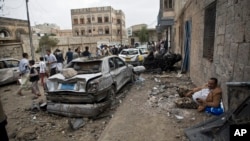At a café in the capital, Sana'a, the day after 80 people were killed in the bloodiest day of the Yemen conflict so far, there are no lights, no waiters and no food.
Labib Haj, a human rights activist from the southern city of Aden, sits in the dim room, discussing the war with his colleagues. Like many Yemenis, he wants the warring parties to strike a deal to stop the bloodletting before deciding how the country should be governed.
“I wish all sides would stop referring to each other with words that will increase hatred and divisions in the society, ultimately making the war worse,” Haj said Thursday.
Yemen's war intensified this week with heavy fighting between locally grown militias and Houthi fighters in the port city Aden, airstrikes by Saudi-led forces across the country, and Saudi-Houthi battles along the border.
In the centrally located capital, where Houthis have been for nearly nine months, locals say they prefer adjusting to the Houthi’s northern culture than continued war.
Houthi rule
Houthis control government facilities these days and can be identified by stickers on their guns and the sound of their “strange” northern music, said activist and journalist Summer Nasser.
“Their presence is available,” Nassser said. “Their slogans are everywhere, I mean everywhere, literally. Even if they’re not there, they have their slogans everywhere: on the walls, on the streets. So you feel their presence.”
The popular Houthi slogan, “Death to America, Death to Israel” is considered more of a nod to Iran than an actual goal, but activists said Sana’a is far more xenophobic than it once was.
Iran has been accused by many of supplying arms to the Houthis but denies the charge.
The three-month-old war is primarily between the Houthis, allied with part of the Yemeni Army still loyal to ousted president Ali Abdullah Saleh, and the exiled government of President Abd-Rabbu Mansour Hadi, who is supported by a Saudi-led, 10-nation coalition and another faction of the Yemeni Army.
The World Health Organizations said nearly 2,000 people have been killed in fighting between March 19 and May 22 and a third of the population is “in urgent need of medical help.”
Amnesty International blames both the coalition bombings and Houthi anti-aircraft weapons for civilian deaths.
Al-Qaida, tribal militias and the Islamic State group add to the chaos, not to mention individuals and small groups of Yemenis picking up weapons simply to defend their homes.
In early April, the United Nations called the war in Yemen "catastrophic" and the humanitarian situation has deteriorated since then.
Talks canceled
Peace talks scheduled for this week in Geneva were canceled but will be re-scheduled at the “earliest possible opportunity,” said Stéphane Dujarric, spokesman for U.N. Secretary-General Ban Ki-moon, on Thursday.
“The Secretary-General reiterated his firm belief that there is no military solution to this conflict,” Dujarric said.
However, activists in Yemen said Saudi Arabia appears determined to completely destroy the Houthis, who have consistently ignored calls to lay down their weapons.
Meanwhile, business has come to a standstill across the country and schools are mostly closed, said Nagib, a primary school art teacher in Sana’a.
He said before his school closed, he would reprimand children who wrote Houthi slogans on their notebooks or on the walls, telling them that politics don’t belong in school.
Human Rights Watch said Houthis and other militias are increasingly recruiting children as scouts, guards and fighters. And nowadays, Nagib added, there’s little he can do.
“After the schools officially closed, so many of our youth and children have become involved in these bloody battles,” he said. “This is a positive development for the militias. It helps them.”
Fras Shamsan contributed to this report from Sana'a.





